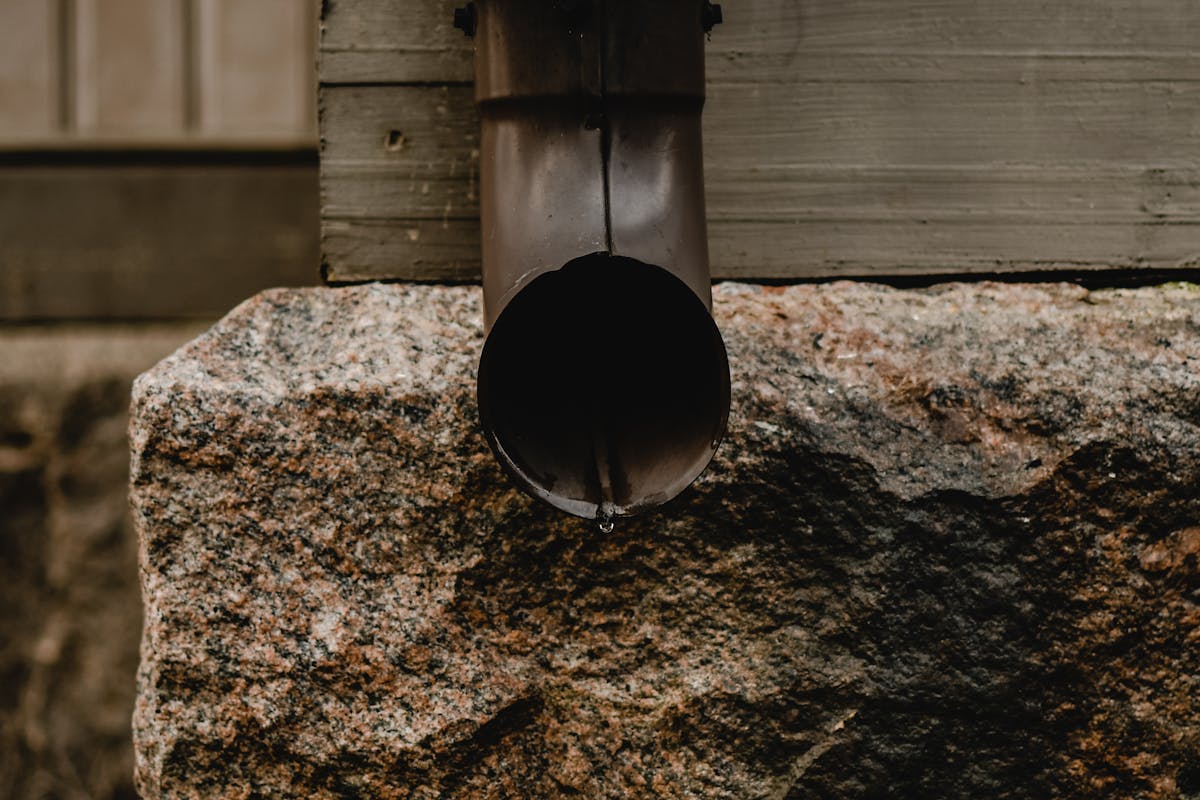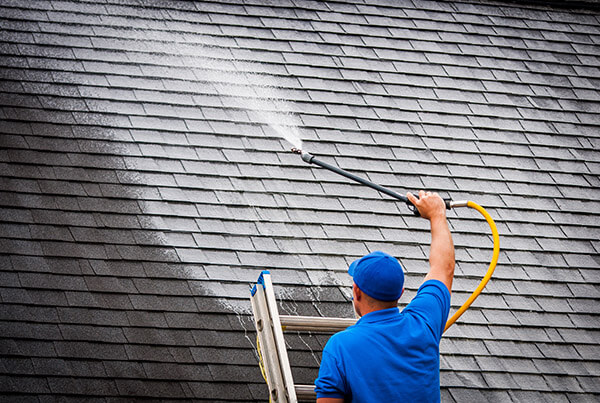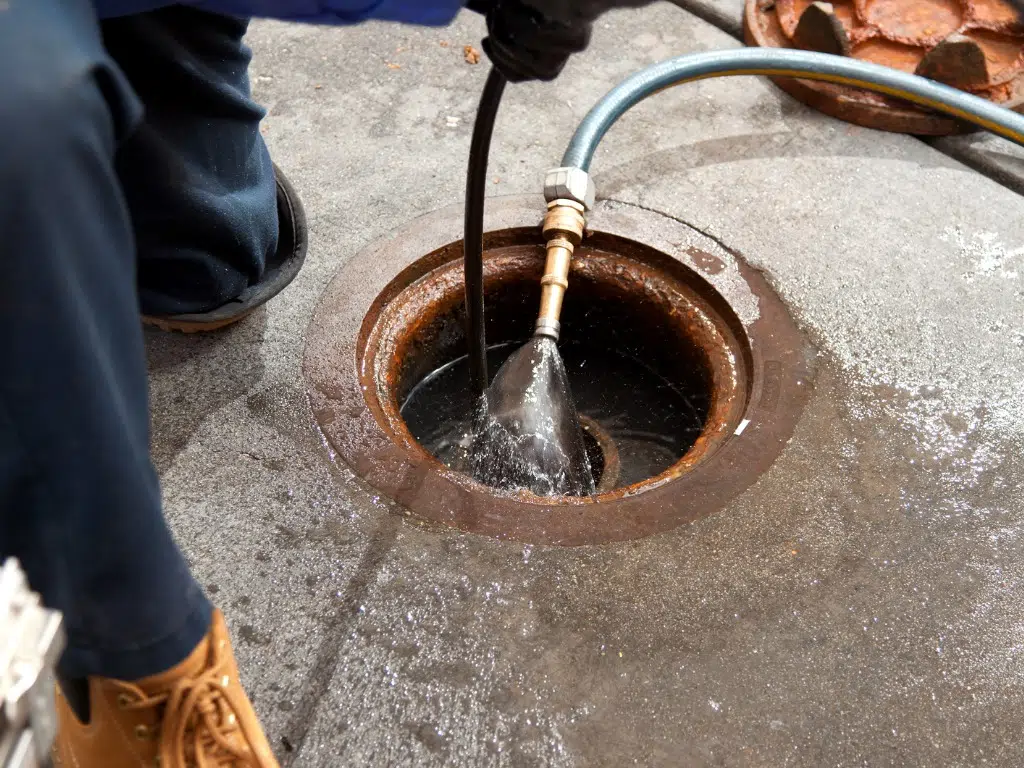When it rains heavily, one of the most overlooked parts of your home’s exterior is the downspout drainage system. Your roof might do an excellent job collecting water, but if that water isn’t guided away from the foundation properly, you could end up with flooding, erosion, or even foundation damage. An efficient downspout drainage system is key to protecting your property and ensuring long-term stability.
At Ware Landscaping, we’ve seen first-hand how poor drainage creates costly headaches. But with the right solutions, you can direct water safely away from your home while even enhancing your landscape design. Let’s explore the top downspout drainage ideas for efficient water management.
1. Splash Blocks
The simplest way to divert water is with splash blocks placed directly under the downspout. These concrete or plastic channels help guide water away from the foundation. While inexpensive and easy to install, splash blocks only push water a few feet away. They work best if your property already slopes away from the house.
Best for: Homes with natural yard slopes and minor water flow issues.
2. Downspout Extensions
Extensions attach directly to the base of your downspout and carry water further from your foundation. They come in rigid or flexible designs, allowing you to direct water where you want it to go. Extensions are affordable and highly effective, but they can sometimes interfere with mowing or foot traffic if not positioned carefully.
Best for: Redirecting water away from foundation walls in small to medium yards.
3. Underground Drainage Pipes
If you want a cleaner look, underground drainage is a more permanent solution. These pipes are buried beneath the soil, carrying water from the downspout to a safe discharge point—like a storm drain, dry well, or low-lying area. Underground pipes prevent pooling near your home and are ideal for properties where water management is a consistent issue.
Best for: Long-term drainage solutions and properties with recurring flooding.
4. French Drains
A French drain combines a perforated pipe with gravel, installed underground to redirect water away from problem areas. As rainwater collects, it seeps through the gravel and into the pipe, then flows out to a safer location. French drains are excellent for managing large amounts of water and preventing soggy lawns.
Best for: Yards with poor drainage, heavy rainfall, or low-lying areas.
5. Dry Wells
A dry well is a subsurface storage area that collects runoff water and gradually disperses it into the surrounding soil. It acts as a buffer to prevent overloading drainage systems during storms. Dry wells are eco-friendly, cost-effective, and can be paired with underground piping for maximum efficiency.
Best for: Handling high water volume in areas with adequate soil drainage.
6. Rain Gardens
For a more eco-conscious and visually appealing option, rain gardens are an excellent choice. These shallow, landscaped depressions are planted with native flowers, grasses, and shrubs that thrive in both wet and dry conditions. As water from downspouts flows into the garden, plants and soil filter it naturally while reducing runoff.
Best for: Homeowners who want functional drainage with aesthetic appeal.
7. Catch Basins and Grates
Installed below grade, catch basins collect large volumes of water and filter out debris before sending it through underground pipes. They prevent yard flooding and protect underground systems from clogging. Catch basins can be disguised with decorative grates to blend into your landscaping.
Best for: Large properties or homes with heavy stormwater accumulation.
8. Rain Barrels and Storage Tanks
If you’d like to conserve water, a rain barrel system can turn stormwater into a resource. Barrels connect to your downspout and collect runoff, which can then be used for watering gardens, washing cars, or other outdoor needs. Larger storage tanks can be installed underground for bigger water conservation projects.
Best for: Eco-friendly homeowners looking to recycle rainwater.
Tips for Choosing the Right Drainage Solution
- Assess your landscape: Consider the slope, soil type, and natural low spots in your yard.
- Plan for overflow: Even the best systems need a backup plan for heavy rains.
- Think long-term: Choose solutions that will serve you well for years without frequent maintenance.
- Blend with landscaping: Many drainage options can be integrated seamlessly into your yard design.
When You Need an Expert
While simple solutions like splash blocks and extensions are easy DIY fixes, more complex systems such as underground pipes, French drains, or dry wells require professional expertise. Improper installation can worsen the problem rather than solve it. That’s where Ware Landscaping comes in.
Our team specializes in designing and installing efficient drainage solutions tailored to your property. Whether you’re dealing with foundation flooding, soggy lawns, or just want a sustainable water management system, we’ll ensure the job is done right the first time.
Our Previous Drainage System Work
Final Thoughts
Downspout drainage isn’t just about avoiding puddles; it’s about protecting your home, preserving your landscaping, and managing stormwater responsibly. From simple splash blocks to eco-friendly rain gardens, there’s a solution for every homeowner. If you’re ready to take control of your water management system, reach out to Ware Landscaping today and keep your property dry, safe, and beautiful.








